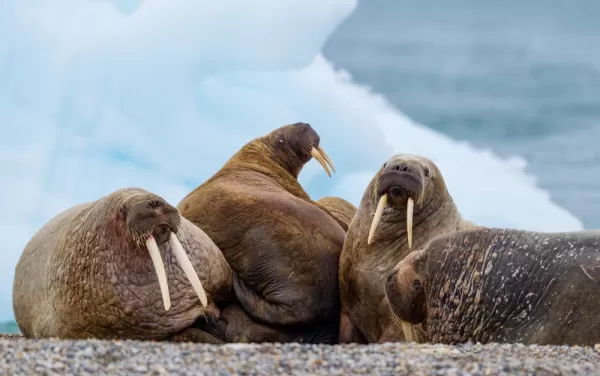This voyage takes you into the pack ice and along the remote shorelines of rugged north Spitsbergen. Our landings may change due to sea ice, weather conditions, and wildlife sightings. The expedition leader determines the final plan. Potential destinations include:
Raudfjord
On the north coast of Spitsbergen, you enjoy this expansive fjord filled with glaciers – and maybe even visit by ringed and bearded seals. The cliffs and shoreline also support thriving seabird colonies, rich vegetation, and the possibility of polar bears.
Hamiltonbukta
Here you can see an impressive colony of Brünnich’s guillemots.
Ytre Norskøya
This small island was once a lookout point for Dutch whalers, and in fact, you can still follow their tracks to the summit of the island. The remains of 17th-century blubber ovens can also be seen near about 200 graves. The north side of the island offers the rare opportunity to see puffins near their breeding places, and there is even a small colony of kittiwakes.
Monaco Glacier
Depending on the weather and sea ice, you could sail into Liefdefjorden and cruise within sight of the 5-kilometer-long (3.1 miles) face of Monaco Glacier. The waters in front of this precipitous glacier are a favorite feeding spot for thousands of kittiwakes, and the base of the ice is a popular polar bear hunting ground. If ice conditions prevent sailing here early in the season, travelers can implement an alternate route along the west coast of Spitsbergen.
Northwest of Raudfjord
Travelers aim to sail into the pack ice outside the territorial waters of Svalbard, watching for polar bears and elusive Greenland (bowhead) whales. Sail from 80 N to 76 N along and in the outer fringes of the ice edge, look for harp seals, hooded seals, polar bears, and migrating seabirds like little auks, Brünnich’s guillemots, and kittiwakes. On previous voyages in this area, travelers have sometimes seen up to a hundred bowhead whales. Have the chance to see northern bottlenose whales and the first fin whales of the season. The pack ice sailing will be a highlight of this voyage and may take up to three days.
Forlandsundet, St. Johns Fjord, or Alkhornet
Walruses sometimes haul out in Forlandsundet. Alternatively, travelers might sail into St. Johns Fjord or south to the mouth of Isfjorden, landing at Alkhornet. Seabirds nest on these cliffs, Arctic foxes search below for fallen eggs and chicks, and reindeer graze the sparse vegetation.

























